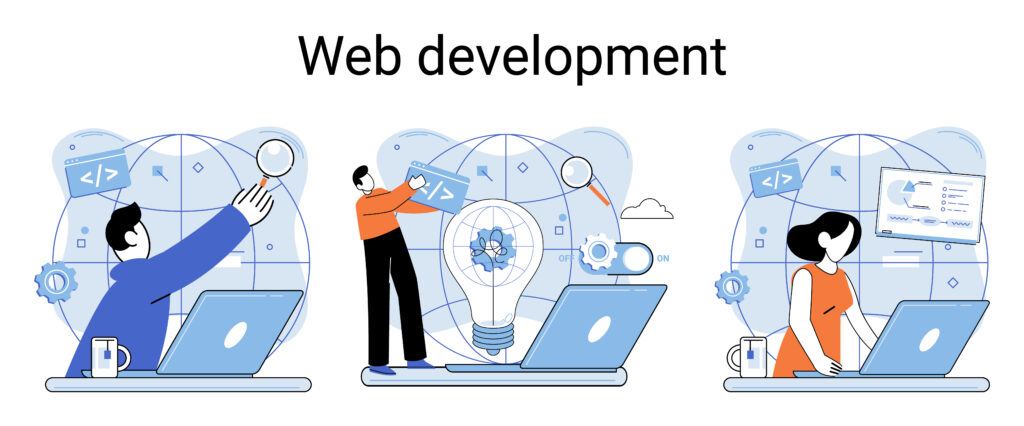Why Angular?
In the dynamic realm of web development, staying ahead of the curve is crucial for businesses to flourish. When it comes to selecting the ideal framework for constructing resilient and scalable web applications, one framework reigns supreme – Angular.
With each iteration, Angular has evolved, introducing a multitude of enhancements and innovations. From Angular 4 to the latest Angular 14, this framework has continually pushed the boundaries of web development.
So, what sets Angular apart? Why do entrepreneurs gravitate towards it for their business applications? In the following sections, we will unravel the answers to these questions and delve into the diverse features and advantages that make Angular an irresistible choice for building cutting-edge web applications. Brace yourself for an expedition into the realm of Angular’s potential and witness firsthand how it can revolutionize your web development ventures.
Understanding Angular
Angular, also known as AngularJS or Angular 2+, is a widely adopted and robust framework utilized for constructing exceptional web applications. It was engineered by Google and provides a structured and efficient approach to web development.
Angular adheres to the Model-View-Controller (MVC) architectural pattern, enabling developers to segregate concerns and develop modular, easily maintainable code. Furthermore, Angular leverages TypeScript, a superset of JavaScript, which enhances productivity and code quality by introducing static typing and additional features.
By leveraging Angular, developers can craft dynamic and responsive applications, facilitate seamless data binding, implement effective routing mechanisms, and harness an extensive array of built-in features and libraries. Irrespective of your level of expertise, familiarizing yourself with Angular is imperative in the realm of modern web development.
Different Angular Versions
- Angular 4:
Introduced in 2017, it focused on improved performance and smaller bundle sizes. - Angular 5:
Released later in 2017, it brought enhancements like an improved build optimizer and support for progressive web apps. - Angular 7:
Introduced in 2018, it included updates to Angular Material, improved CLI prompts, and performance optimizations. - Angular 8:
Released in 2019, it introduced features like differential loading, lazy loading of components, and improved web worker support. - Angular 10:
Released in 2020, it focused on improving performance, stability, and the Angular Material library. - Angular 11:
Released in 2020, it brought updates like stricter types, improved logging, and a new CSS selector. - Angular 12:
Released in 2021, it introduced features like stricter types, improved compilation, and enhanced error messages. - Angular 13:
Released in 2021, it focused on improving the compilation process and the Angular DevTools. - Angular 14:
Released in 2022, it brought updates to the Angular Material library, improvements to the Ivy compiler, and bug fixes.Read also: The Exciting New Features of Angular 7.0 Version
Features of Angular
- Dependency injection
- Component-based architecture
- Directives
- Templates
- Routing
- Forms handling
- Reactive programming support
- Cross-platform compatibility
- Internationalization and localization support
- Testing support
Why Use Angular?
Angular provides numerous advantages that make it a popular choice for web development:
- Enhanced Developer Productivity:
Angular’s comprehensive tooling, including the Angular CLI (Command Line Interface), simplifies project setup, code generation, and deployment. Its robust ecosystem and community support contribute to increased developer productivity. - Declarative Templates and Data Binding:
Angular’s template syntax allows developers to create expressive, declarative UI templates that are easy to understand and maintain. Two-way data binding automates the synchronization of data between the model and the view, reducing boilerplate code. - Modular Architecture and Component-Based Approach:
Angular promotes a modular and component-based structure, enabling code reusability and separation of concerns. This modular approach improves the maintainability and scalability of applications. - Dependency Injection and Testability:
Angular’s built-in dependency injection system simplifies managing dependencies between components and services. This feature enhances code testability, making it easier to write unit tests and ensure application stability. - Performance Optimization:
Angular optimizes performance through features like lazy loading, Ahead-of-Time (AOT) compilation, and tree shaking. It ensures faster rendering, minimal loading times, and smoother user experiences.
- Cross-Platform Development:
Angular allows developers to build applications that run seamlessly on various platforms, including web browsers, desktops, and mobile devices. This capability reduces development time and effort.
Read also: Top 10 JS Frameworks of 2020
Why Entrepreneurs Choose Angular
Entrepreneurs prefer Angular for several reasons:
- Scalability and Enterprise-Level Support:
Angular’s robust architecture and extensive community support make it suitable for enterprise-level applications. It can handle complex requirements and accommodate growth without sacrificing performance. - Time-to-Market Advantage:
Angular’s powerful features, tools, and well-defined development practices enable rapid application development. This advantage is crucial in today’s competitive business landscape where delivering products quickly is essential. - Rich UI/UX Capabilities:
Angular’s extensive library of UI components, coupled with its flexibility for customization, enables the creation of visually appealing and interactive user interfaces. This capability enhances the overall user experience and satisfaction. - Mobile-Friendly Approach:
Angular supports responsive design principles and provides tools for building native mobile applications. It ensures consistent user experiences across devices, catering to the growing mobile user base. - SEO-Friendliness:
Angular offers server-side rendering capabilities, which enhance search engine optimization (SEO) by enabling search engines to crawl and index web applications effectively. This feature helps improve visibility and organic traffic to websites.Read also: AngularJS vs NodeJS vs ReactJS vs Vue.js
Benefits of Angular
Angular brings a wide range of benefits to businesses:
Business Benefits
- Increased Productivity and Cost-Efficiency:
Angular’s streamlined development process, reusable components, and comprehensive tooling significantly improve productivity. It reduces development time and costs. - Seamless Team Collaboration and Code Maintainability:
Angular’s modular architecture and component-based approach facilitate team collaboration, as developers can work on different components simultaneously. Code maintainability becomes more manageable as changes in one component have minimal impact on others. - Faster Time-to-Market and Competitive Advantage:
With Angular’s features like code generation, reusable components, and rapid development cycles, businesses can bring their products to market quickly, gaining a competitive edge. - Enhanced Customer Satisfaction and User Engagement:
Angular’s rich UI/UX capabilities enable businesses to create visually appealing and intuitive interfaces. This results in improved customer satisfaction, higher engagement, and increased conversions.
Technical Benefits
- Powerful Data Binding and Real-Time Updates:
Angular’s data binding simplifies data synchronization between the model and the view, providing real-time updates without manual intervention. - Enhanced Performance and Speed:
Angular’s optimization techniques, such as lazy loading, AOT compilation, and efficient rendering, ensure fast-loading and high-performance web applications. - Robust Error Handling and Debugging:
Angular’s error handling features provide detailed error messages and stack traces, making debugging and troubleshooting easier for developers. - Comprehensive Testing Support:
Angular offers testing tools and frameworks that facilitate unit testing, integration testing, and end-to-end testing, ensuring the stability and quality of applications.
Conclusion
Angular has become a dominant force in web development due to its extensive features, robustness, and benefits for entrepreneurs. Its modular architecture, declarative templates, and comprehensive tooling simplify development, enhance productivity, and enable the creation of impressive business applications.
Whether it’s scalability, time-to-market advantage, rich UI/UX capabilities, or technical benefits like performance optimization and testing support, Angular proves to be an excellent choice for businesses looking to build reliable and feature-rich web applications. Embrace Angular and unlock the vast potential it holds for your business success.












